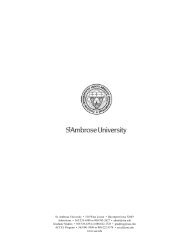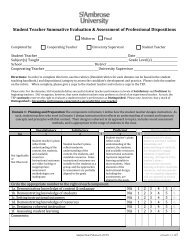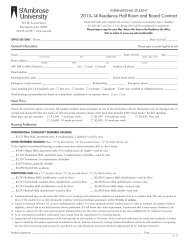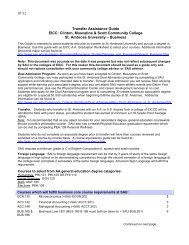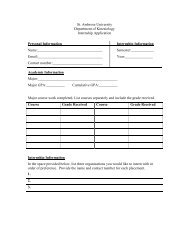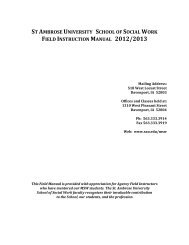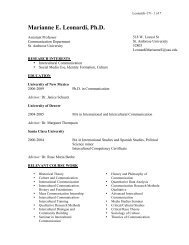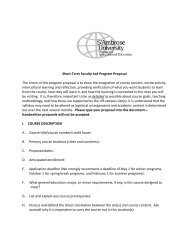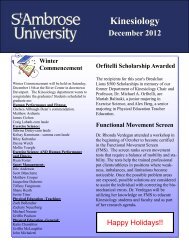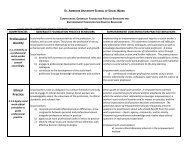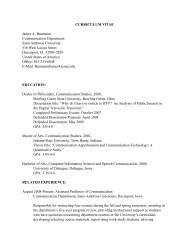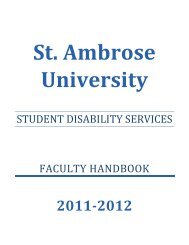St. Ambrose University 518 West Locust Davenport Iowa 52803 admit
St. Ambrose University 518 West Locust Davenport Iowa 52803 admit
St. Ambrose University 518 West Locust Davenport Iowa 52803 admit
Create successful ePaper yourself
Turn your PDF publications into a flip-book with our unique Google optimized e-Paper software.
Graduate Curricula<br />
Admissions Appeal Procedure<br />
1. A written request for review must be submitted<br />
that describes any extenuating circumstances<br />
that would explain the non-qualifying<br />
GPA.<br />
2. In addition the candidate may also include letters<br />
of recommendation that speak to the candidates<br />
abilities and commitment to graduate<br />
level work.<br />
3. The candidate may also include any other<br />
materials he/she feels would be beneficial for<br />
admissions consideration.<br />
4. After reviewing the materials submitted by the<br />
candidate the department may request an<br />
interview.<br />
<strong>St</strong>udent Retention Policy<br />
1. The student must maintain at least a 3.0 average<br />
in all graduate course work.<br />
2. Only two C’s are allowed in graduate level<br />
courses including graduate level prerequisites.<br />
3. A student who falls below a 3.0 GPA in graduate<br />
work will be considered on probation.<br />
The student must remove the probationary<br />
status within 9 credit hours of course work. If<br />
the probationary status is not removed, the<br />
student is dismissed from the program.<br />
4. A student dismissed for academic reasons may<br />
reapply for admissions after one calendar year<br />
and should follow the Admissions Appeal<br />
Procedure.<br />
5. A course may be retaken only once in order to<br />
improve a grade and a maximum of three<br />
classes may be repeated for grade improvement<br />
purposes.<br />
6. There is no residency requirement.<br />
7. A student must complete the degree within a<br />
5-year period.<br />
Degree Requirements<br />
The requirements for the MS in ITM are divided<br />
into three components: computer core, business<br />
core, and electives.The minimum required credit<br />
hours is 36.<br />
All courses listed below are 3 credit hours.<br />
Computer Core: 15 credit hours required: CSCI<br />
560, 570, 600, 650, 640.<br />
Business Core: 9 credit hours required, (Up to 15<br />
credit hours may be required if the student needs<br />
the MBA leveling courses): MBA 507, 621, 670.<br />
Electives: Complete 12 credit hours from the following.<br />
(At least 9 credit hours must be selected<br />
from CSCI courses): CSCI 515, 610, 660, 700,<br />
750, 780, 790 (thesis research requires departmental<br />
approval. May be repeated for up to 6<br />
credit hours), MBA 782.<br />
Course Descriptions<br />
CSCI 515. Computer and Network<br />
Security<br />
3 credits<br />
This course will present the basic concepts and<br />
techniques for securing a computer system and<br />
for securing information systems in a network<br />
environment. Topics to be studied include – site<br />
security, security management, intrusion detection/protection,<br />
integrity management, and event<br />
recovery. Prerequisites: CSCI 370 or equivalent.<br />
CSCI 560. Advanced Database Management<br />
Systems<br />
3 credits<br />
Expanded coverage on normalization and SQL.<br />
Developing databases in different DBMS systems.<br />
Evaluate other means of accessing a database.<br />
This course provides students with an in-depth<br />
understanding of database application design and<br />
database management for large and small businesses;<br />
practical experience using formal database<br />
design methodologies in systems development;<br />
and an understanding of the technological issues<br />
of database systems in a modern IT infrastructure.<br />
The main topics include advanced modeling<br />
of business applications, database logical design,<br />
normalization through decomposition and synthesis,<br />
physical design, concurrency, security, and<br />
transaction management issues, contemporary<br />
issues of object-oriented databases, advanced<br />
database applications, multimedia databases,<br />
data warehousing, data mining, OLAP, and<br />
233



